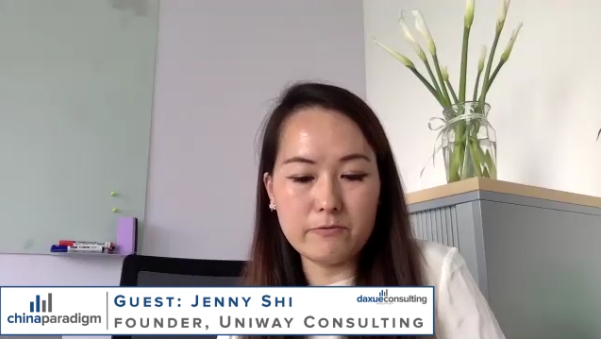What do Business Professionals say about Recruiting in China?
While China’s economy continues its “managed deceleration“, the employment rate in China has remained stable in 2017. Sectors such as the wine and trading businesses have slowed down their hiring policies in China, but talented employees are still in high demand, even though general labor markets are increasing their requirement levels.
Five years ago, foreigners were the mainstream trend in the Chinese labor market. This trend has diminished as more businesses are seeking applicants with bicultural backgrounds, usually Chinese-European (French/German/English speaking talents), with experience abroad or working on multicultural teams. Although rarer, Chinese-speaking foreigners are highly sought after for top management positions, which demand a good understanding of the local market.
Mastering the language and customs of China is an important asset for foreigners working in China. However, in today’s competitive labor and fast-changing Chinese market, this is not sufficient. The most sought-after profiles are also the “transformational leaders“, or – in other words – leaders who not only have the ability to strategically reposition a firm, but also lead the company in stages of growth and development.
[button animation=”bounceInUp” animation_delay=”200″ animation_iteration=”1″ style=”1″ color=”#555555″ hover_color=”#000″ background_color=”#1e497c” icon=”icon-briefcase” icon_upload=”” icon_position=”centre” url=”https://daxueconseil.fr/recruter-en-chine-7-prejuges-tenaces/” target=”_blank” align=”alignnone”]Read the French version here[/button]
Companies have evolved to become more collaborative -the matrix organization having progressively replaced the hierarchical structure- and must face new challenges, especially global digitalization. Transformation management becomes crucial and leaders are judged more and more by recruiters on their ability to make their teams and organizations evolve.
Finding these top level recruits has become a challenge for SMEs in China. Most of the foreign companies with a presence in China want to know how to recruit quality employees, who will help prevent high turnover that could negatively impact the company.
To answer those questions, Daxue Consulting gathered the best advice of two direct approach recruiting firms specializing in the recruitment of executives and high level managers in China. Since the administrative and personnel management in China can be complex, we have also interviewed a specialist on the staffing practices in China who solves company’s administrative and staff management issues.
Eric Egiziano

“The rapid pace of change in China is challenging us to have flexible business skills and to focus on understanding the potential of talents capable of leading transformation projects.”
Eric Egiziano, 15 years of experience in Recruiting, General Manager of Lincoln Shanghai, relocated to China in 2013.
Based in China since 2010, Lincoln is a European consultancy specializing in executive search, interim management, and leadership advisory.
Nicolas Milonas

« Whether you are a SME or a renowned multinational company, when recruiting in China,you must be attractive. »
Nicolas Milonas, in China for the past 13 years, founder and CEO of Acropolis Capital.
Founded in New York and present in China since 2004, Acropolis Capital specializes in direct approach recruitment of senior executives.
Jeida Boussenina

“Controlling the elements of a work contract and the laws that govern it is essential to the success of your recruitment process.”
Jeida Boussenina, Recruitment and Invoicing manager at INS Consulting since 2015.
Based in Shanghai since 2006, INS Consulting specializes in the administrative procedures management, accounting and tax declarations.
7 persistent prejudices on recruiting in China demystified by HR specialists
Prejudice #1: in China, you can recruit faster than anywhere else
Wrong. In China, everything evolves faster than in the rest of the world, and that is precisely what attracts many entrepreneurs and candidates to the country. There is a huge risk when not adapting to the Chinese speed. You may find yourself left behind by your competition. However, this concept does not apply when it comes to recruiting in China.
In China, like everywhere else, a recruitment mission takes time, with several steps to complete. As Eric Egiziano clarifies it, “although business moves faster in China, companies can be stalled in the hiring process.” which explains why recruiting missions in China can take as long as in Europe.
The desire to accelerate the process to mitigate relatively short periods of notice of resignation should not take precedence over the quality of recruitment. Jeida Boussenina reminds that the notice of resignation varies from three days, during the trying period, to thirty days on a long-term contract, without accounting for specificities.
These thirty days may unnerve most of the CEOs, but hiring the first candidate who shows up would be the worst thing to do. To obtain a qualitative shortlist of two to three good candidates, Eric Egiziano explains that it is sometimes necessary to contact 300 talents, depending on the profile wanted and the expectations of the company. He then must meet between three and thirty of those candidates, before making a definitive choice. Therefore, it can take between several weeks to several months when it comes to recruiting in China.
Prejudice #2: Recruitment standards are universal
Wrong. Diplomas and experience cumulated abroad are not created equal in China.That is particularly true in the digital sector. China’s digital landscape is extremely fragmented, made of numerous small companies. In the country of BAT (Baidu, Alibaba, Tencent), a Facebook expert will not be considered as an ideal candidate. Although it is true that China requires local skills, it is not in your best interest to define too much in detail your potential employer’s characteristics.
When recruiting in China, being open-minded will always be positive. Eric Egiziano observes that “the smart thing to do is stay open to different profiles and to be agile”. This way, your search could lead you to some nice surprises. Stating from the get-go that nationality is a key-point can be a mistake, as it reduces the number of candidates, and therefore, the number of applicants with an interesting potential. “The rapid pace of change in China is challenging us to have flexible business skills and to focus on understanding the potential of talents capable of leading transformation projects.” says Lincoln Shanghai’s general manager.
Nicolas Milonas points out on his side that in order to identify the most relevant profiles, it is important to know “how to approach them”. This will allow a deeper understanding of their personality, their career plans, and their family situation. You will then need to ensure that their style will go well with the personality and expectations of their future managers and the teams that they will join.
Prejudice #3: Talented candidates will come to you
Wrong. Thanks to a flourishing economy, China offers many career opportunities, especially for candidates having sought-after skills, such as perfect fluency of English and Mandarin, or dual citizenship. Just like in Silicon Valley, a company present in the Chinese market must be attractive to the most qualified talents. “The market is favorable to candidates right now” notes Nicolas Milonas, “Whether you are a SME or a renowned multinational company when recruiting in China, you must be appealing“.
In that optic, Eric Egiziano states that the first question recruiters need to ask is “How can you give desire to people, who were not candidates at first, to become candidates?” His answer is to develop a communication strategy, created and managed by HR departments, to gain attractivity. The goals will be to put in perspective the company’s values, its culture, its managerial policy and career possibilities for employees. Being perceived as a company that respects its employees, clients, and partners, and that offers a fulfilling working environment and interesting career opportunities, is a prerequisite to increase its attractiveness.
But Nicolas Milonas warns against over embellishing the company’s attributes. He believes that HR departments or high-level managers could make promises they have no intentions to uphold. “It happens often and inevitably leads to failure when recruiting in China”. “Disappointment, loss of motivation and resignation are the beginnings of a downward spiral”. In order to boost your “employer branding”, several options are possible:
- Increase your brand visibility during recruiting events. Although these networking events are costly investments, their fallout on the long term cannot be dismissed: in addition to reflecting a positive image of the organization, this kind of events can also help the company to gain a good understanding of various profiles. During these events, your most helpful and motivated employees must be present, as they are your greatest communication asset.
- Turn your employees into brand ambassadors. Those events are not the only opportunity you have to involve your employees in the hiring process in China. Referral recruitment, which consists in encouraging your employees to use their personal networks as a source of hire, has a double benefit. Firstly, this strategy can help on improving the quality of your recruitment. Secondly, it can also serve as a lever for motivating your employees. Employee referral can also prevent casting errors by better identifying candidate’s expectations, his compatibility with the company’s culture and his will to join your team.
Prejudice #4: the all-digital is sufficient
Wrong. Although digital platforms are a great tool, posting ads online is not enough to recruit in China, where “guanxi” (关系 or relationship network) remains the best way to find a job. In order to get in touch with the best candidates in China, think H2H – “human to human” or marketing human to human.
Make contact with students
As part of a long-term recruitment strategy, it is essential to start making contacts with your future candidates.
Introduce yourself to Chinese students. Thus, Eric Egiziano emphasizes the importance for companies to establish a real internship policy and solid relations with universities and schools. This, in order to attract students and make them want to become your future employees, by creating a training program and possible professional growth. By getting closer to universities and schools, you will be able to target young students or the most promising continuing education students.
Maintaining relationship with foreign students. Making yourself known to them and supporting them in their wish to live in China through employment opportunities or internships could be an important asset to attract the most determined students.
Mobilize your enterprise network
However, staffing needs cannot always wait for students to graduate and get fully qualified for a job. In order to meet the people you are looking for, Jeida Boussenina advises you to make the most of your network and in your participation in trade shows. Networking is a critical part of business that could lead to the development professional relationships. In the case of recruitment, previous work relationships can be advantageous to working on future projects.
Prejudice #5: China remains « cheap »
Wrong. Recruiting in China, training or even dismissing is expensive. The failure of many companies in China is usually linked to a short-term vision of its leaders and often due to initial undercapitalization. To avoid the early termination of your projects due to a poor estimation of personnel costs in China, it is important to pay attention to different points:
The sharp rise in wages in China. The salary allocated to the future employee is obviously an element to consider in your budget. It is important to know that in China, over the last five years, the remuneration level has increased significantly, with annual averages between 8% and 10%. The rise in wages has even reached 15 to 20% in some industries.
According to Jeida Boussenina, « there are specific skills that make certain profiles very attractive for both local and international companies ». It is the case, for example of a foreigner who masters Mandarin, or of a multilingual Chinese. Recruiters must therefore be aware of this added value and its cost in terms of salary. Nicolas Milonas also echoes this view, since according to him « either the company agrees to pay the market price, or it has trouble to attract ». However, a remuneration policy aligned with the market price can also cause problems, because « it can cause internal problems with the salary grid ».
When determining if there is enough room in the budget to hire someone, it is important to know the candidate’s expectations for a given position. Think also to other forms of remuneration, which are very popular among expatriates. Certain advantages for foreign employees may be included in the contract without additional taxes:
- A housing allowance
- An allocation dedicated to the children’s education
- A health Insurance
- Mandarin training for the employee
- Round trip plane tickets to his home country
- Compensation for installation costs in a new city (valid only once)
The latter allows you to add value to the contract offered to your future employee, without seeing a rise in tax expenses.
Expense items to remember. The process of recruiting in China has in itself costs that you should be aware of. According to Nicolas Milonas, « we tend to forget the real cost of a recruitment session, in addition to the costs of training and the remuneration of a new recruit ». However, according to the President of Acropolis, « the total cost must take into account the potential recruitments that have failed for the same position ».
These expense items are:
- Job ads fees;
- The time spent by human resources and managers to process files and interview candidates;
- The negative impact for the company of a failed recruitment (in the case of the resignation or dismissal of a person who did not fit, or worse, a low-motivated person who clings to the business);
- The salaries and expenses paid to the various successive collaborators.
Another potential expense item, Chinese employment law provides compensation to be paid to the employee in case of dismissal (except in the case of serious misconduct which involves neither notice nor compensation.). Jeida Boussenina mentions that in the case where the employee accepts the reason of his dismissal, the amount paid to the dismissed employee will be calculated on the basis of his seniority in the company:
- Contract less than 6 months : ½ month salary if the person acknowledges the reasons of his dismissal ;
- Current contract between 6 months and one year: 1 month of salary ;
- Contract longer than one year: 1 month salary per year worked (with a ceiling of 12 months paid).
Jeida Boussenina mentions that Chinese labor law stipulates that in the case where the employee refuses the reasons of his dismissal, you will then have to negotiate with him, to determine the conditions of his departure.
Prejudice #6: All the recruitment platforms are the same
Wrong. To hire in China, it is essential for you to search in the right place. Otherwise, you are facing the risk of being “drowned” under a substantial number of irrelevant replies. Moreover, this process must be studied to identify which platform(s) to use. Considering your expectations, it is crucial to post your announcements in the right place and for a defined target, but also to make an efficient screening of the received applications. To avoid receiving a large number of irrelevant CV’s, it is therefore important to understand the functioning of the key players of the sector, and of their targeted audience.
Jeida Boussenina provided us a detailed picture of the main recruitment sites in China:
Platforms for Chinese applicants
Zhaopin.com (招聘): Only available in Chinese, this platform exists since 1994 and has more than a million users of all experience levels. The website proposes interesting recruitment and formation services. Zhaopin is therefore ideal if you want to reach a large variety of profiles, especially those applying for middle management or entry-level jobs.
51job.com (前程无忧): Based on the same principles as Zhaopin, this platform is also available in English, hence opened to foreign applicants who cannot speak Mandarin. 51job provides a powerful searching tool allowing recruiters to target the most appropriate profiles, thanks to its recruitment management tool “eHire”. On this platform, you will also find heterogeneous profiles, from chief executive to waiter in a restaurant.
Liepin.com (猎聘): Only available in Chinese, this platform is particularly adapted to high-standard talents, since it allows recruiters to be connected with qualified headhunters. Liepin has been growing in popularity recently, at the expense of traditional sites such as Zhaopin or 51job.
Platforms for international applicants
ChinaJob.com: Sponsored by the Chinese government, this English-written website is intended to address the needs of companies implanted in China. It includes very useful functionalities such as a recruitment service or the free publication of CV’s. There are also other searching platforms in English, such as Jing Job or Career Builder.
LinkedIn : Main actor in the West, LinkedIn also exists in China. Although LinkedIn isn’t as well established as in the West at the moment, the site relies itself on its association with the CIIC (China International Intellectech Cooperation) in order to attract high-qualified foreign profiles in the middle/long term. The LinkedIn team in China also developed and launched in June 2015, an application intended for Chinese professionals. Named Chitu (赤兔, literally “Red Rabbit”), this app can be useful to find high-standard talents with good foreign language skills (English skills in particular).
Those platforms reach all business sectors and are therefore generalists. If you are looking for a very specific or specialized position (which belongs to a niche industry for example), Jeida Boussenina suggests you use professional websites dedicated to a specific industry. For example, Reefe network is a network gathering professionals specialized in architecture, design, and construction in Asia.
Prejudice #7 : China is adventure, administrative procedures are not that important
Wrong. There is in China an important work legislation including a constraining part. The type of contract proposed to your new employee is therefore determinant in your negotiation strategy. It is thus necessary to be aware of the local legislation. Regarding the issues related to employment agreements in China, Jeida Boussenina identified two of them:
- Local basic agreement: The most standard contract for Chinese employees;
- Local agreement Plus: It is often addressed to foreign employees.
The second option is not a specific contract, but a local agreement provided with advantages decided by the recruiters. Some companies cannot afford investing in an expatriate agreement –this is the reason why they adopt this type of contract. Through this compromise, the recruiter recognizes the employee relocation. This implies a more significant wage and several advantages, such as a round trip by plane to his/her home country, an additional medical coverage, and more paid vacation (from ten days for a basic agreement to three weeks for an expatriate contract) without taking the eleven Chinese non-working days into account.
Furthermore, there are three main agreement types: the fixed-term contract, the permanent contract, and the assignment contract. Probation period length varies in accordance with the duration of the contract:
- No probation period for a contract lasting less than one year;
- Two months for a one to three years contract;
- Six months for a contract lasting more than three years.
And finally, the legal work duration specified in the contract will also be determined. It is important to note that beyond the daily eight working hours, the hourly rate will increase by 1,5 with a limit of three extra hours per day. Moreover, the hourly cost is doubled on weekends, and tripled on national holidays.
[ctt template=”2″ link=”a77R4″ via=”yes” ]”Controlling the elements of a work contract and the laws that govern it is essential to the success of your recruitment process.”[/ctt]
To sum up
Our experts agree on this principle: An identified recruitment policy is crucial in every single human resources strategy. To familiarize yourself with the common hiring practices in China, keep these essential tips in mind:
#1: Take your time: A recruitment process should not be rushed.
#2:Be open-minded and flexible.
#3: Work on your own “employer branding”.
#4: Connect with different audiences and develop the H2H (“human to human”).
#5: Don’t underestimate the allocated budget for the recruitment process.
#6: Pick adapted recruitment platforms depending on your targeted profiles.
#7: Be aware of the Chinese legal environment.
To conclude, it is essential to measure the efficiency of former recruitments. For that purpose, you will have to check some indicators such as the turnoverrate of your company, the existence of long-term vacancies, or the unsatisfying performances of current teams. It will help you to analyze your recruitment policy, and ensure you that your future employees will stay for a long time in your company.
This article was written in partnership with Eric Egiziano (Lincoln), Nicolas Milonas (Acropolis Capital) and Jeida Boussenina (INS Consulting). Daxue Consulting would like to thank them for their availability as well as for their insightful consultation, which helped a lot in the redaction of this article.
Daxue Consulting expertise
Advising companies in China is at the heart of what we do at Daxue Consulting. In the human resources sector, our research team regularly leads organizational and managerial studies. With its experience inthe Chinese Market, our team will help you to identify the methodology so that you can achieve your management objectives in China. Through our expertise, our clients are ensured to get personalized recommendations regarding their issues of internal satisfaction measures. We guarantee implementable recommendations while considering each available possibility.
Contact us to learn more about the suitable managerial and organizational practices in China.





